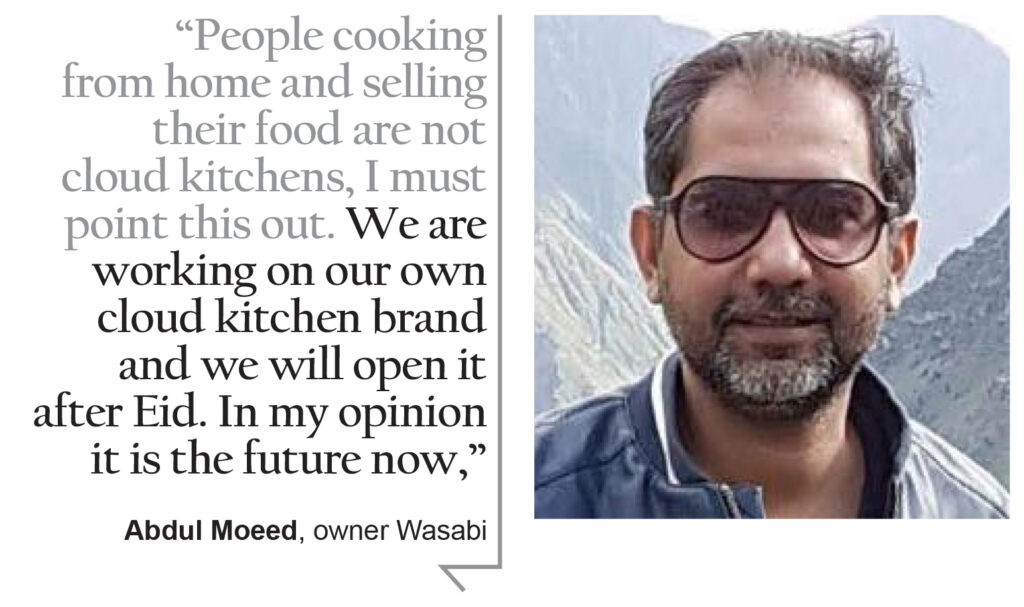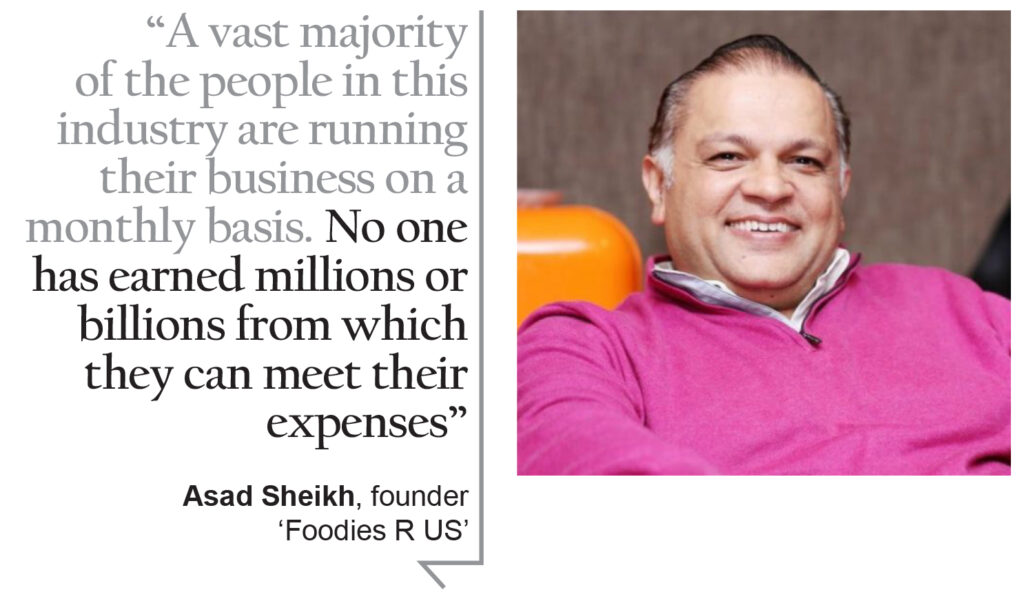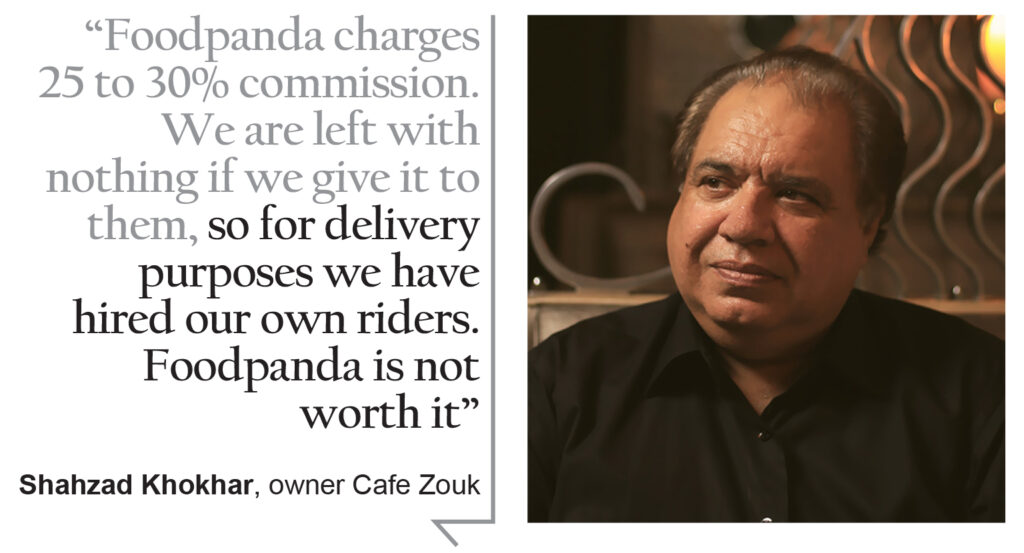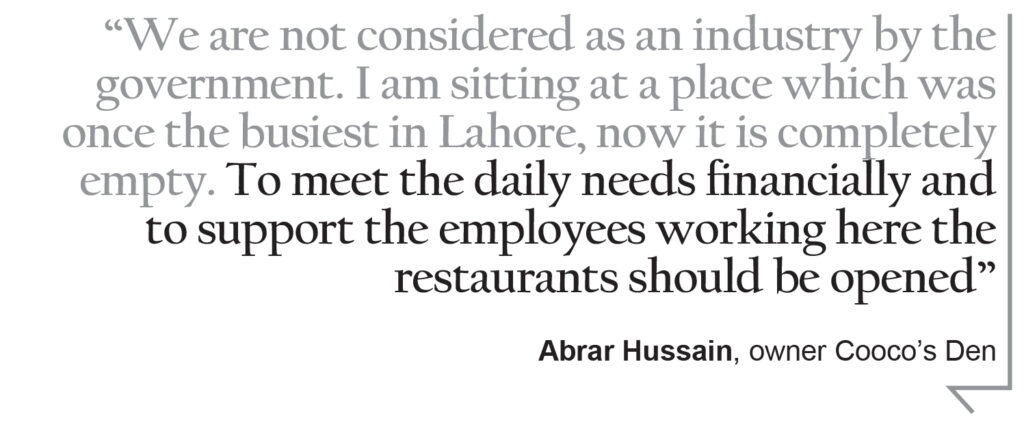Of all the long list of businesses and industries affected by the Covid-19 pandemic, one of the industries most disastrously affected have been restaurants. The food end of the hospitality industry has been hit particularly because of how integral tight spaces and mingling is to them. They are the opposite of social distancing, and even in countries like Pakistan where lockdowns have been eased, restaurants have not been allowed to open more than their limited take-away and delivery services.
Stakeholders and wage earners in the industry generally believe that restauranteering has generally been unable to establish roots in Pakistan, and has also stayed away from government attention and has escaped the net of economic relief measures. This has resulted in the job insecurity of the people associated with this sector.
And with circumstances changing with every passing day, and no way to predict where this pandemic will go or when it will end, the entire restaurant industry and the supply chain associated with it has been reeling. Workers continue to lose jobs and restaurants that owners have spent a lifetime working towards are going under in a matter of days.
With such a morbid situation on hand, the industry has had to cling on the lifeline of delivery and takeaway. Luckily enough, the World Health Organization (WHO) and other research has shown that the chances of contracting the virus through such food services is negligible. Even more importantly, the little risk there is has been minimised by contactless delivery and delivery services that have improved and tweaked their models in accordance with new realities.
But where exactly does the industry stand? Despite the lifeline, they are continuing to bleed into the ground with no help in sight. Do restaurant owners think they can open, or perhaps even have some innovative ideas on how to do so? Profit takes a look at the state of the industry.
Divided industry opinions
There are no surprises that the industry, like most industries, is split on this important decision. On one side are those that want to reopen restaurants. On the surface, they sound reckless. Restaurants are places that are crammed, sanitisation is difficult and people may not want to go not just because of the risks, but also because of the diminished experience that enhanced social distancing standard operating procedures would cause.
But the crunch is hard enough for them to want the government to relent. And they have a point: the same concerns are true for public transport and malls, but the government has allowed them to function with impunity.
In fact, if precedent is anything to go by, the restaurant industry could possibly go to the courts and demand they be allowed to open just like the shopping malls were allowed to open. The judicial logic stands firm, and with the highest court in the land ruling on it, they have little to fear.

In fact, they may not even have to go to court themselves, so active and concerned are our berobed heroes that they may take notice of restaurants not being open and open them all over the country, and then perhaps even direct the public to frequent them at pains of being held in contempt.
The other side seems more sensible, not just because they are following scientific regulations with their stance, but also because they make more business sense and are more savvy than panicked in this situation.
These restaurateurs are of the view that the restaurants should not be opened during the time of pandemic as it would be of no use. In fact, it could very well be counter productive. The fact of the matter is, if the government does open restaurants, they will not just be hubs of disease, but also unpleasant to go to. Running in and out of disinfectant gates, wearing masks and sanitizing are not activities people want to do during a dining experience.
So not only will the turnout probably be low, the cost of maintaining social distancing and enhanced disinfecting protocols will also have an effect. People will continue to order more, and the extra investment in this will have to continue even as the cost to keep the doors of the establishment open make owners sweat. Moreover, if even a single employee tests positive, that means a catastrophic break in operations.
This faction goes so far as to suggest that the government should not allow the opening of any kind of restaurants until they overcome the pandemic. And short of a patriotic court order forcing them to open, they are ready to stand by their stance.
People from the food sector and associated with the restaurants are also of the opinion that the restaurateurs are not seen on the same page like other industries and businessmen and that was one of the reasons why this industry could not get on to negotiations with the government for getting the restaurants opened.
One prominent figure who is a presence in the food industry is Asad Sheikh, the founder of Foodies R Us Facebook group, who told Profit that there was still a lingering fear factor there in the idea of opening restaurants. “We are again seeing tweets and hearing people say that the lockdown might get extended. There is a major fear, what if we open up the restaurants, call back our staff, most of whom have gone to their native towns, and suddenly again the government announces to close the restaurants?” he questions. “We will have to manage a great deal under such conditions.”
Meanwhile, on an individual level, those that are demanding restaurants open make a compelling emotional argument, this is their lives and their work. One of them is the owner of Lahore’s famous ‘Cooco’s Den’ on Fort Road Food Street, Abrar Hussain, was of the opinion that the restaurants should be opened like other industries. “We are not considered as an industry by the government. I am sitting at a place which was once the busiest in Lahore, now it is completely empty. To meet the daily needs financially and to support the employees working here the restaurants should be opened.”
How far have deliveries got us covered?
Asad Sheikh agreed that some of the restaurant owners were desperate to open up the restaurants. “Most of them have started the home delivery service, but that is only 10–15% of the restaurant’s revenue. Obviously these people have to pay the landlords and other commercial utility bills. Under the prevailing conditions, some landlords are flexible while some are not, and thus the restaurateurs have to deal with them as well,” he tells us. “Only 2-3% of the restaurants have their own buildings. The rest of them are all in rented spaces as this business is done in this manner. Moreover, the owners have to pay salaries to the staff they have retained and also to the vendors.”
Shahzad Khokhar, the owner of Café Zouk, said that home delivery is not the solution. “There are big dine in set ups for restaurants and for home delivery there is just one kitchen needed. We opened our kitchen only for home delivery and received a huge electricity bill and gas bill. So that’s not the solution.”
Khokhar said that he was not dealing with Foodpanda. “They charge 25-30% commission. We are left with nothing if we give it to them, so for delivery purposes we have hired our own riders. Foodpanda is not worth it. Before all this, almost a year or two ago, they were not charging us anything but now they demanded commission. We cannot be compared with the international restaurants or chains who can afford them.”
Meanwhile, Abdul Moeed, the owner of the Japanese restaurant Wasabi, said that home delivery was of no use. “Expenses are there but the sale is not open. When we deliver food, we have to call the staff, open the kitchen etc and the expenses remain there. We also have to pay the landlord even during the closure we have been receiving electricity bills up to Rs200,000. Foodpanda has been associated with my restaurant for a long time and we do give them commissions. When we open our cloud kitchen, we will be partnering with Foodpanda and they might give us a kitchen as well.”

Abrar Hussain said that the delivery services like Foodpanda and others were not providing service in the walled city locality of Lahore. “They do not take orders from us in routine and moreover, they demand a lot of commission. If we pay them 20-25%, what are we left with later?’
Cloud kitchens the new reality?
As Moeed was explaining, perhaps the new groove that restaurants will settle into are cloud kitchens.This model can be a number of things, including having coworking kitchen spaces that cost less and avoid incurring costs such as rent and utilities.
A cloud kitchen is primarily a restaurant kitchen that accepts incoming orders only through online ordering systems and offers no dine-in facility. They have a base kitchen that delivers food to the customers’ doorstep.
What is interesting about this is that cloud kitchens have been a pre-pandemic concept. In fact, internationally, in 2018 consumers spent $10.2 billion on delivery services. This was an increase of 42% from the previous year. And considering the kind of world we will inhabit after the pandemic is over will be very different from the one we remember, investing in cloud kitchens may not be the worst idea around.
Food bloggers such as Sonal Mishra have been saying for a long time that restaurants that do away with brick and mortar locations and focus only on takeaways will be the ones to succeed, especially since restaurant experts unanimously predict the future as being delivery-oriented and there are several studies to support this claim.
In Pakistan, the concept has had a mixed reception amid the current pandemic from those already in the business and used to brick and mortar restaurants. Moeed was of the opinion that cloud kitchens are cheaper since there is no staff needed, and no set up like Foodpanda is required either. “People cooking from home and selling their food are not cloud kitchens, I must point this out. We are working on our own cloud kitchen brand and we will open it after Eid. In my opinion it is the future now,” he said.
Others were more sceptical, with Khokhar saying that cloud kitchens were not very well established, and it was hard pushing something like this in uncertain times. “Small scale food entrepreneurs are already doing this. Whoever knows how to cook a half decent meal has started an online food service from home without owning any restaurant or dine in set up. Ambiance and dine-in is a completely different experience that cannot be done away with,” he said.
Abrar Hussain was also strongly opposed to the concept, and he would be since his particular restaurant is all about the location and the experience. “People come to my restaurant for the beautiful scenic view of Badshahi Mosque and Lahore fort. These views and dine out experience on rooftops cannot be provided in a cloud restaurant. This is the work of people who happen to learn good cooking and then make a facebook page and sell their food to offices and houses. We have invested so much in ambiance and décor that we cannot move to a cloud restaurant or kitchen.”
Meanwhile, for those that are running cloud kitchens already, things are going well. They have been affected too, even though they are in the ‘home cooks’ category that all of the restaurant owners seem to vehemently deride. One such person is Afshan Khalid, who runs a cloud kitchen out of her home in DHA.
“I have been running this business for two years now. A cloud kitchen is a restaurant or a kitchen that accepts orders only through online ordering systems and offers no dine-in facility. I started cooking at home and through facebook and word of mouth I managed to get good customers for my dishes,” she explains to us. “I did not face much problem during the lockdown because I have my son delivering the food on a bike to different houses in the locality. Yes, the loss was when the offices were also closed, but I still managed it. I think people should move to this trend as it needs no investment for dining set up or ambiance and one can also earn.”
Can’t the restaurant industry throw around its weight?
One of the problems is that the restaurant industry does not seem to have any tangible lobby around to fight for its causes and concerns. There is a loose association headed by Kamran Sheikh which did meet with the government according to Khokhar, but little came of it. “We met the provincial government and Aleem Khan as well and proposed the opening of the restaurants. They are thinking it over but have not given us any solid response up until now. Let us see what they come up with,” he told Profit.
Meanwhile the owner of Wasabi, Moeed, said that the government may open restaurants after Eid. “We did meet the ministers. They are saying to open the restaurants after Eid so let’s hope for the best. But the government is of the opinion that allowing deliveries has been enough relief as it is for restaurants. Abrar Hussain also feels a lack of cohesion within the industry, saying industry realities mean there cannot be a healthy lobby or grouping among the restaurant owners like they have in textile or other sectors. “If I talk about the restaurants in my area, there is a lot of competition and people are usually leg pullers. Every restaurant owner works for his own interest and there are very few occasions where I have seen unity among all.”

Not only do these restaurants not have a strong lobby, another problem is that their owners are usually living month to month and have not made huge sums of money to keep them afloat. “A vast majority of the people in this industry are running their business on a monthly basis. No one has earned millions or billions from which they can meet their expenses,” Asad Sheikh explains to us. The sentiment is resonated by the others.
“Do not compare us with chains like McDonald’s or others. We are working on a month to month basis and paying huge bills,” Khokhar tells us. “There is an impression that we are from a very affluent class and that is why we are running this business. But this is not true for most owners, let alone the staff that actually runs the place.”
“People think that it is a money making business and belongs to the rich but they do not know the backend expenses of this business,” says Moeed. “A lot of investors come into this business thinking they will make an easy buck without any know how of this industry. Almost 90% of the restaurants were working from rented buildings and did not own the property. Even those 10% who have their own property include the rent of their building in their expenses.”
Abrar Hussain reflected the same, saying it was a misconception that the restaurant owners are rich. “I own this Haveli in which we opened the restaurant and that is my only saving. I don’t have a landlord to whom I have to pay the rent, but on the other hand, I am still paying the bills. I used to meet my daily expenses from the sale of the restaurant, and none of us on the food street has earned millions that can be used during this time.”
What are the demands?
One thing is clear and has everyone in consensus, there needs to be some form of assistance from the government to the industry. Asad Sheikh suggested that the government give special packages for them as they did for textile or other industries. “There should be some package for this industry as well. The hospitality business is among the top five industries when it comes to employment, and in case this industry faces a loss, there will be a lot of unemployment in the country.”

Asad Sheikh was of the view that in case the government allows the opening of restaurants it would be under strict SOPs. “There will be a limit to the number of persons in a restaurant, usage of sanitizers, keeping the place clean, wearing of masks etc. SOPs for restaurants would be very strict if applied and incase of violation the government would surely impose heavy fines.”
Khokhar was distressed that so far the government had not declared the restaurants as an industry, which they very much should. “The government has no realization of this industry. This is a serious industry and the staff working in restaurants is becoming jobless because there is no earning of the restaurant. How can we pay them as there are not much back up funds as well? We have met Aleem Khan and asked him to give us a status of industry. Only the business and industry of the rich has been opened like construction, textile, transport etc.”
Another suggestion has been that landlords be told to lay off taking rent for the time that the pandemic is going on and the government has forced closure. The logic being that since the government has imposed the lockdown, even if for the public good and public health, it becomes incumbent on the government to either pay their rent or make sure landlords do not demand rents.
“When these restaurants are opened with SOPs by the government and if the capacity is to be decreased by 50%, then how would these expenses be met?” Khokhar asks. “The landlords would not understand this and charge the complete rent. The bills will remain the same. The Sindh government did give relief by passing a law that rent up to three million will be reduced to 50% and no tenant will be moved out of the building till the further orders of Sindh government. Similar acts should be made by the Punjab government as well. In Punjab, the buildings are owned by the politicians and thus the monopoly remains there and that is why no such step is being taken up by the Punjab Government.”



















